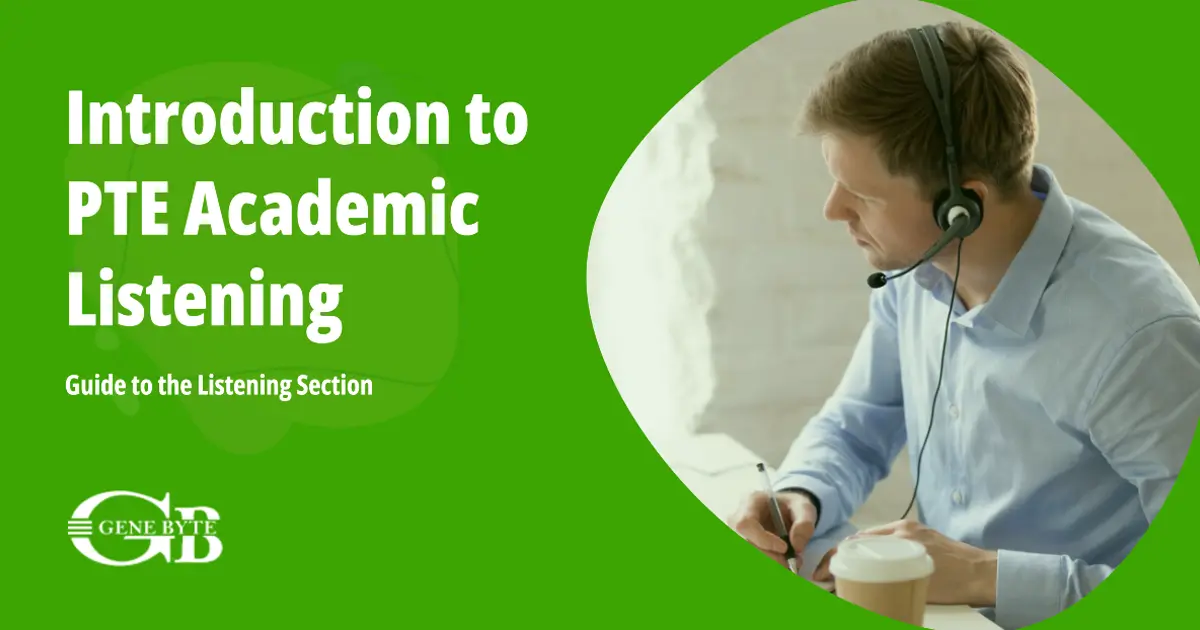Mastering the Art of PTE Academic Listening: A Guide for Teachers

"Master the art of teaching PTE Academic Listening with Genebyte—where technology meets pedagogy to turn proficiency into perfection."
The Listening section of the PTE Academic exam is crucial for both students and educators. Genebyte's B2B SaaS solutions blend technology with teaching methods to help institutes meet the demands of a digital-first world.
Key Takeaways:
- Eight Question Types: Includes summarizing spoken text, filling in the blanks, and writing from dictation.
- Strategic Preparation: Focus on key areas to boost student success and enhance your institute's reputation.
- Enhance Teaching: Use Genebyte's tools to improve listening skills instruction.
- Boost Success: Help students excel in the Listening section and improve overall test performance.
- Modern Solutions: Our AI-powered software transforms traditional methods into engaging, effective learning experiences.
Transform your teaching approach with Genebyte's insights and tools for better student performance.

Introduction to PTE Academic Listening
The Role of Listening in Language Proficiency Testing
The PTE Academic, a globally recognized computer-based English proficiency test, places a significant emphasis on the Listening section. Here, candidates are assessed across eight distinct question types, each designed to measure different facets of listening ability, from understanding spoken text to the accuracy of written dictation. The total score for these eight question types contributes a substantial 52 out of the overall 90 points for listening skills, underlining the weight this section holds in the test's framework.
Overview of Listening in the PTE Academic Framework
In the the PTE Academic, the Listening section is uniquely constructed to challenge test-takers' ability to process and comprehend English in an academic context. With a combined timer ranging from 30 to 43 minutes, candidates must exhibit precision and efficiency to navigate through tasks such as summarizing spoken text, selecting missing words, and identifying incorrect words within a transcript. The time management aspect is critical, as it reflects real-world scenarios where individuals must process information swiftly and accurately.
The Importance of Listening Skills for PTE Academic Success
For educators, the PTE Academic Listening section serves as a mirror reflecting the real-time English usage required in academic and professional environments. Understanding the scoring intricacies of each question type enables educators to guide their students in honing the skills that will yield the highest score improvements. Emphasizing high-weightage question types, such as Write from Dictation, which integrates listening with writing skills, can be particularly effective in elevating a student's performance.

Summarize Spoken Text
Understanding the Task
The task of Summarize Spoken Text is a pivotal part of the PTE Academic Listening section. Test-takers are given 10 minutes to listen, interpret, and condense a recording into a 50-70 word summary. This task is unique as it requires a combination of active listening and concise writing, challenging students to distill the essence of spoken information accurately.
Scoring Criteria
The scoring of this task is multifaceted, with points awarded for content, form, grammar, vocabulary range, and spelling. Each aspect has an allocated score, summing up to a high partial scoring criteria. This highlights the need for a nuanced understanding of the English language, going beyond mere listening to include writing skills that are essential for effective communication.
| Content | Form | Grammar | Vocabulary Range | Spelling | Total Points |
|---|---|---|---|---|---|
| 2 | 2 | 2 | 2 | 2 | 10 |
All scores are out of a maximum of 2 points each, based on the task's high importance within the Listening section. The total reflects the partial scoring nature of the task.
Practical Tip:
In preparing students for this task, teachers should focus on exercises that enhance both listening and summarization skills. Genebyte's SaaS solutions provide an ideal platform for this, with features that allow educators to simulate test conditions, track student progress, and provide targeted feedback to improve both listening comprehension and written expression.

Multiple-Choice Questions: Multiple Answers
The Challenge of Choice
In the PTE Academic Listening section, the Multiple-choice, Choose Multiple Answer question type presents a nuanced challenge. Candidates are tested not just on their ability to understand the content and tone of the recording, but also on their decision-making skills to select more than one correct answer from several options. This demands that test-takers refine their critical listening skills, distinguishing between relevant information and distractors.
Scoring Nuances
Scoring for this question type is based on a partial credit system, meaning that points are awarded for each correct response selected and no points are deducted for omitted answers. However, selecting incorrect options can negatively affect the overall score, adding a layer of complexity to the task. It emphasizes precision over quantity, rewarding the quality of choices rather than the number of selections made.
Key Considerations for Multiple-Choice, Choose Multiple Answers
- Accuracy in selection is paramount; avoid choosing options solely because they contain familiar words or phrases.
- Critical thinking is crucial; focus on the relevance of the information to the question posed.
- Teach students to identify key information during practice to build confidence and decision-making skills.

Fill in the Blanks
Listening for Gaps
The Fill in the Blanks task within the PTE Academic Listening section is a critical test of a candidate's ability to identify and understand words within the context of a recording. A transcript appears on the screen with several gaps, and as the audio plays, candidates must fill in these blanks with the correct words heard. This task not only assesses listening skills but also evaluates a candidate's ability to connect spoken language with its written form, a skill crucial in academic settings.
Scoring for Accuracy
Accuracy is the cornerstone of scoring in the Fill in the Blanks task. Each correctly filled blank contributes to the score, with a high importance placed on this question type within the Listening section. The partial credit system ensures that candidates are rewarded for each correct word, encouraging meticulous attention to the audio and the text provided.
| Listening Skill | Writing Skill | Importance | Scoring Type |
|---|---|---|---|
| 8 points | 8 points | High | Partial |
Scores reflect the dual focus on listening and writing abilities, with a high importance indicating a significant impact on the total Listening section score.
Genebyte's SaaS platform enhances this learning process by allowing educators to create custom practice tests that mimic the Fill in the Blanks task, enabling students to practice in a realistic environment. The detailed analytics provided helps in identifying areas where students struggle, allowing for personalized guidance and improvement strategies.

Highlight Correct Summary
Integration of Listening and Summarizing Skills
In the PTE Academic's Listening section, the Highlight Correct Summary task is designed to assess a student's ability to comprehend and condense spoken English. This question type challenges students to listen to a recording and then select the paragraph that best summarizes what they have heard. It requires a keen ear for detail and the ability to synthesize information—a skill set that is crucial not only for test success but for academic and professional environments where effective note-taking and summarization are key.
Scoring and Importance for Academic Listening
The scoring for Highlight Correct Summary is binary; it is either correct or incorrect, emphasizing the importance of accuracy in understanding and interpreting the main ideas and details of the spoken text. Although it has a low individual point value, its significance lies in the ability to discern the main points from a spoken passage, which is a critical skill in real-world academic settings.
Core Abilities Assessed by Highlight Correct Summary
- Comprehension of main points and details
- Synthesis of information into a coherent summary
- Selection of the most accurate summary from multiple choices

Multiple-Choice Questions: Single Answer
The Power of Precision
In the PTE Academic Listening section, the Multiple-choice, Choose Single Answer task is a testament to the power of precision. Candidates are required to listen to a recording and then pinpoint the one option that correctly answers a question about the content or tone of what was just heard. This task assesses a listener's ability to focus on specific information and make accurate judgments based on a single listen.
Understanding the Scoring Dynamics
The scoring for this question type is straightforward: there is only one point available, and it is awarded entirely if the correct answer is chosen, reflecting a binary 'correct or incorrect' system. Despite its low point value, the precision required for this task is high-stakes, as it can be the difference between a pass and a fail for a candidate on the cusp of their desired score.
Key Insights for Multiple-Choice, Choose Single Answer
- Critical listening and precise response selection are essential.
- There is no room for error, as only one option is correct.
- Educators should emphasize the importance of attention to detail and the elimination of distractors during practice.

Select Missing Word
Listening for Completion
The Select Missing Word task in the PTE Academic Listening section involves predictive listening—a skill where students must anticipate and identify a missing word or words at the end of a recording. The task presents an incomplete audio and requires the test-taker to select the appropriate completion from a list of options. This tests not only the understanding of the spoken content but also the ability to predict language outcomes based on contextual clues.
Scoring Based on Predictive Listening
Scoring for Select Missing Word is definitive, marked as correct or incorrect. This binary scoring system underscores the importance of precise listening and decision-making, as there is no partial credit for near misses. Each correct answer contributes one point to the total score, which can be crucial for students aiming for higher score bands.
Tips for Excelling in Select Missing Word
- Encourage students to focus closely on the overall message and context clues within the audio.
- Practice predictive listening by exposing students to varied audio materials.
- Reinforce the importance of immediate selection once the answer is recognized, as the audio is not replayed.

Highlight Incorrect Words
Skill of Discrimination in Listening
The Highlight Incorrect Words task in the PTE Academic tests the listening and reading skills. Candidates are presented with a transcript on screen and must identify words that differ from what is spoken in the recording. This requires acute attention to detail and the ability to distinguish between what is heard and what is seen, a skill that is especially valuable in scenarios where information is received both audibly and visually.
Accuracy in Scoring
Scoring for Highlight Incorrect Words is clear-cut: responses are either correct or incorrect, with no partial credit. Each word correctly identified contributes to the overall score, making precision of utmost importance. It is crucial for candidates to maintain concentration throughout the recording, as they only have one opportunity to hear the audio and must rely on their immediate comprehension to identify discrepancies.
Strategies for Highlight Incorrect Words
- Advise students against taking notes; instead, stay focused on the recording.
- Practice hovering the cursor over the words to quickly identify and select incorrect ones.
- Train students to trust their first instinct and not second-guess their choices, as the audio will not be replayed.
Through Genebyte's SaaS platform, educators can replicate the conditions of the Highlight Incorrect Words task, allowing students to practice in an environment that mirrors the PTE Academic test. This facilitates the development of the critical listening skills necessary to excel in this task, solidifying Genebyte's role as a crucial resource for PTE Academic preparation.

Write from Dictation
The Intersection of Listening and Writing
Write from Dictation is a crucial component of the PTE Academic Listening section! In this task, test-takers listen to a short recording and transcribe the sentence verbatim. This exercise tests the ability to accurately capture spoken English in written form, a skill highly valued not only in academic settings but also in real-world professional contexts. It requires a sharp ear for detail and a swift hand at transcription, capturing anywhere from 7 to 17 words within a limited time frame.
Scoring for Verbatim Accuracy
Accuracy is paramount in Write from Dictation, with points awarded for each word correctly transcribed. The task carries a high weightage in the listening score, reflecting its significance in the overall PTE Academic assessment. It is scored partially, meaning that test-takers receive points for each correct word they write down, encouraging them to strive for complete and accurate responses.
| Listening Skill | Writing Skill | Time Given | Word Count | Scoring |
|---|---|---|---|---|
| High | High | 3-5 sec | 7-17 words | Partial |
The table emphasizes the dual focus on listening and writing skills, highlighting the task's high importance in the scoring of the Listening section.
At Genebyte, we understand the rigorous demands of tasks like Write from Dictation which epitomize the intersection between Listening and Writing skills. Our SaaS solutions are designed to simulate the PTE Academic's testing environment, providing a practice platform that helps students enhance both their listening acuity and transcription proficiency. Through our platform, educators can offer targeted exercises that refine these skills, ensuring students are well-prepared to achieve their desired scores.

The Genebyte Advantage in PTE Academic Listening Preparation
Technological Integration in Listening Skill Development
At Genebyte, we recognize that mastering the Listening section of the PTE Academic requires more than just practice; it demands a technologically advanced approach that mirrors the complexity of the actual exam. Our platform integrates state-of-the-art speech recognition and analysis tools, providing an immersive learning experience that sharpens listening skills through realistic simulations of the PTE Academic environment. This tech-driven approach ensures that every nuance of the English language, from intonation to lexical stress, is captured, offering students a comprehensive preparation journey.
Customized Solutions for Institutes
Each coaching institute has its unique set of challenges and requirements. Genebyte's platform acknowledges this diversity by offering customized solutions that align with the specific goals and teaching methodologies of each institute. From customizable practice tests to adaptable learning modules, our SaaS solutions are designed to cater to the individual needs of institutes, enabling them to enhance their teaching efficacy and drive better outcomes for their students.
The Impact of AI on Listening Comprehension and Practice
Artificial Intelligence (AI) is at the heart of Genebyte's offerings, revolutionizing the way listening comprehension is taught and practiced. Our AI algorithms provide immediate feedback on students' responses, allowing for real-time correction and learning. This not only improves listening comprehension skills but also builds students' confidence as they become more adept at understanding and responding to spoken English. The impact of AI extends to predictive analytics, which helps educators identify patterns in students' performance and tailor their coaching strategies accordingly.
Benefits of Genebyte's SaaS Platform for PTE Listening Preparation
- Realistic test simulation with advanced speech recognition.
- Personalized feedback and progress tracking for students.
- AI-driven analytics for targeted teaching and learning strategies.

Actionable Tips to Enhance PTE Academic Listening Prep
The Listening section in the PTE Academic exam is crucial, testing a wide range of auditory and cognitive skills. Mastering this section reflects a candidate's readiness for real-world English use in academic and professional settings. Here are some actionable tips for educators:
- Embrace Technology: Use Genebyte's software for immersive listening practice.
- Customize Learning Paths: Tailor practice sessions to meet diverse student needs.
- Leverage AI Analytics: Gain insights into performance for data-driven teaching.
- Focus on High-Weightage Tasks: Prioritize tasks like Write from Dictation for maximum score gains.
Transformative Learning with Genebyte
Mastering the Listening section is key to PTE Academic success. Genebyte's innovative solutions blend technology and expertise, enhancing the proficiency of educators and students alike. By using our platform, institutes can improve their PTE preparation methods.
Get Started with Genebyte
Experience how Genebyte can revolutionize PTE Academic preparation. Visit our website, schedule a demo, or contact us for more information. Join the elite institutes already benefiting from our technology and elevate your students' learning experience.
Take the next step towards linguistic excellence—partner with Genebyte today and redefine the potential of PTE Academic success.
Frequently Asked Questions
PTE Listening assesses the test-taker's ability to understand spoken English in an academic environment. It includes a variety of tasks such as summarizing spoken text, filling in blanks, and writing from dictation, which reflect real-world scenarios where comprehension and critical thinking are essential.
The PTE Academic Listening section consists of several types of questions, each designed to test different listening skills. These include multiple-choice questions, fill-in-the-blanks, and tasks like summarizing spoken text, with each question type contributing to a comprehensive evaluation of the test-taker's listening abilities.
PTE Listening is scored based on the correct responses given by the test-taker. The tasks are scored individually, with some allowing for partial credit. The total Listening section score is then calculated based on the performance across all tasks.
The PTE Listening score is calculated by adding the points earned from correct responses across all listening tasks. Some tasks offer partial scoring for each correct detail, while others are scored on a correct or incorrect basis.
The PTE Listening section's marks are distributed across various question types. Tasks like Write from Dictation carry more weight, while others like Multiple-choice, choose single answer may contribute less to the total score. Each correct response or detail can add to the score, depending on the task.
The PTE Listening section typically contains between 12 to 20 questions, which span across 8 different task types. The exact number may vary from one test to another.
PTE Listening tasks feature a range of accents to reflect the variety of English as it is spoken globally. This includes, but is not limited to, American, British, and Australian accents.
The total time for the PTE Listening section can range from 30 to 43 minutes, depending on the test version. Certain tasks like Summarize Spoken Text have individual time limits.
The PTE Listening parts include tasks such as:
- Summarize Spoken Text
- Multiple-choice, Choose Multiple Answers
- Fill in the Blanks
- Highlight Correct Summary
- Multiple-choice, Choose Single Answer
- Select Missing Word
- Highlight Incorrect Words
- Write from Dictation
A PTE Listening summary template is a structured guide to help test-takers summarize spoken text. It typically includes cues for capturing the main points, supporting details, and conclusion of the spoken content. However, Genebyte's training emphasizes understanding over templates to foster genuine comprehension skills.
In PTE Listening questions, focus is key. Here's what to prioritize:
- Comprehension: Understand the main idea and supporting details
- Accuracy: Pay attention to specific information for correct answers.
- Predictive Skills: Anticipate what comes next, especially in Select Missing Word tasks.
- Concentration: Maintain focus, as audio plays only once.
- Speed: Work efficiently to manage the overall time for the section.
| Question Type | Focus | Scoring |
|---|---|---|
| Summarize Spoken Text | Comprehension & Summarization | Partial |
| Multiple-choice | Detail Recognition | Correct/Incorrect |
| Fill in the Blanks | Word Recognition & Spelling | Partial |
| Highlight Correct Summary | Main Idea Identification | Correct/Incorrect |
| Select Missing Word | Predictive Listening | Correct/Incorrect |
| Write from Dictation | Listening & Writing Accuracy | Partial |